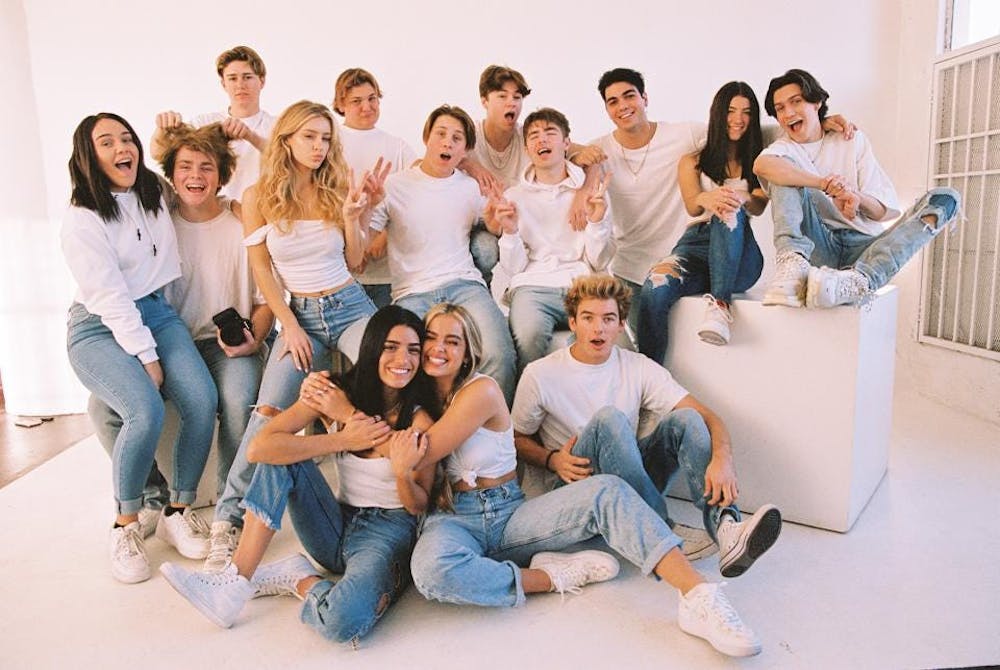Netflix’s “Hype House” is a show that says nothing about, and does nothing with, its cast of almost-recognizable TikTok stars. Despite its polished production and bubblegum-pop score, the show doesn’t deliver the fun of reality TV or the insight of a documentary.
“Hype House” opens on a splashy shot of the group’s $5 million dollar mansion in Moorpark, California. What is meant to welcome the audience into the world of lavish and excess quickly becomes gloomy. The house is sparsely decorated, and aside from the sink full of unwashed dishes, looks barely lived in. Thomas Petrou, the self described house-dad, goes on to introduce the audience to the Hype House. Launched in 2019, the collective was the darling of the 2020 “content house” boom. Boasting the D’Amelio sisters and Addison Rae as residents, the house was once known as a hub of the online A-list. But with the big stars long gone, there is left an unspoken sense of decay and irrelevance.
In its eight episodes, the show attempts to explain the house’s continued existence. The main drama of the show comes from the tension between influencers Thomas Petrou and Cole Chase Hudson, popularly known as Lil Huddy. After Hudson wanted to build a rock music career, he moved from the Hype House to ‘Hype House LA’, a second mansion that, like the Hype House, was rented with the profits from sponsored Tiktoks the group filmed. But wanting to ‘break out’ of his eboy TikTok person, Hudson no longer wanted to make his ads, angering Petrou. While the social media response seems to have squarely labeled Petrou as the villain, it is impossible to watch the show as an adult and not feel endlessly frustrated with Hudson. His mediocre music never seems to justify his vision of himself as a great rockstar, and his refusal to just film one TikTok ad to pay for his sprawling mansion, mind boggling.
Similarly frustrating, the other major plot follows Alex Warren and girlfriend Kouvr Annon. Warren, noticing his social media stardom dimming increasingly, wants to perform big, flashy stunts for attention. But Annon expresses frustrations with the blurring of their business and romantic relationship. With Warren stressed about earning enough to financially support his family, and Kouvr just wanting normalcy, the pair seem miserable. I spent the whole show wanting to hit them on the head and demand they take some time off, or try and get different jobs.
No one in the Hype House seems to really want to be there, and very few of them even seem to want to be on TikTok. But there’s a sense that, for them, there is nothing else. That by leaving, they’d be relinquishing their fifteen minutes of fame, and in turn, their lives would be over.
This sense of gloom is heightened by the fact that no one in the house is particularly interesting to watch. Clearly hyper-aware of the need to protect their reputation, members fail to express a personality outside of their guarded online personas. Drama feels both inauthentic and boring, and moments of vulnerability feel sanitized. Finding stardom during their formative years appears to have robbed most of them of a chance to authentically explore who they are. With the oldest housemate still in his very early twenties, as a viewer you just want them to get out in time to figure out their identity.
The two characters who are actually watchable, interestingly, are not Hype House members, Nikita Dragun and Larray. Dragun in particular, despite coming across just as inauthentic as everyone else, has an energy to her that makes her effortlessly interesting. Whether she’s playing pot stirrer at a dinner party, or walking around in the most Instagrammable outfits imaginable, she brings fun that the show otherwise misses. But even her storylines feel half-baked, with a conversation about her ‘blackfishing’ feeling especially rushed and shallow.
Ultimately, “Hype House” is a show that will make you wish it never existed because you’ll wish the group disbanded before filming ever began. It’s a show that is confusing to all except for the perpetually online, but provides no fun, insight or empathy for the fans most likely to have enjoyed it. It’s a show best watched as a cautionary tale, a reminder that your plan to drop out of college and post TikToks might be just as stressful and isolating as Econ 201.
Get The Chronicle straight to your inbox
Sign up for our weekly newsletter. Cancel at any time.
Millie Caughey is a Trinity first-year and a staff reporter for the news department.

